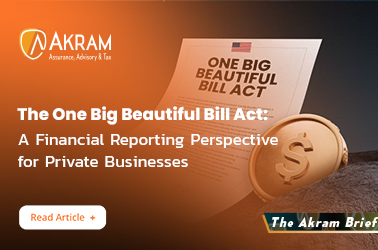Guide for Alternative Investment Funds
What to Look for in a CPA Firm as the Accounting Industry Consolidates
The
accounting landscape is undergoing rapid consolidation, and for alternative
investment funds, this transformation presents unique challenges and
opportunities. As these funds grow and their financial environments become more
complex, the demand for specialized tax, accounting, and consulting services
has never been greater. For these funds, choosing the right CPA firm is about
more than just crunching numbers; it’s about fostering a partnership built on
trust, shared values, and a long-term vision.
In this
article, we’ll explore what to look for in an accounting firm as the industry
consolidates, and how to ensure your chosen firm will remain a valuable partner
throughout your fund’s lifecycle.
1. Ownership Structure and Long-Term Stability
The pace
of mergers and acquisitions in the accounting industry has accelerated, leading
to a surge in private equity-backed and larger national or super-regional firms
acquiring smaller, middle-market firms. For alternative investment funds, these
changes may raise valid concerns:
- Is bigger always better? While larger firms may
bring additional resources, the personal touch and deep industry knowledge
of smaller, independent firms can often provide a more tailored
experience. If your long-time CPA firm merges with a larger entity or
brings in private equity capital, it’s important to assess how this shift
could impact the quality of service you receive.
- Service team continuity: Will the professionals who
know your fund’s business remain the same? In larger firms or those backed
by private equity, changes in staffing can sometimes occur, which might
affect continuity and the depth of your relationship with your team.
Understanding who will be managing your account long-term is a critical
consideration.
- Ownership transparency: It’s essential to have a
clear understanding of the firm’s ownership structure. Firms with a strong
commitment to partnership, like independent or partner-owned firms, often
prioritize long-term client relationships over short-term financial goals.
In contrast, private equity-backed firms may face pressure to adjust
pricing and service models to meet investor expectations.
2. Strength in Proactivity and Long-Term
Partnerships
Gone are
the days when accounting firms focused solely on preparing tax returns and
financial statements. Today, firms need to be proactive in offering consulting
services that guide clients through the entire business lifecycle—from start up to exit.
- Proactive engagement: Choose a firm that
demonstrates a genuine interest in your business. A firm that seeks to
understand your industry, goals, and challenges will be better positioned
to offer timely advice, whether it’s regarding tax planning, structuring,
or regulatory compliance. Firms that take a long-term approach to their
client relationships are more likely to offer continuous, customized
advice as your fund evolves.
- Advisory services that go
beyond the numbers: A proactive accounting firm will provide more
than just reactive services during tax season. They should be engaged
throughout the year, offering strategic advice that aligns with your
fund’s long-term goals. Whether that’s providing insights on upcoming tax
reforms or structuring advice for new investments, having a firm that acts
as a true advisor is invaluable.
3. Customized and Flexible Solutions
As
alternative investment funds navigate a shifting regulatory environment, a
one-size-fits-all approach to accounting and advisory services won’t suffice.
Firms should be able to provide bespoke solutions that reflect your fund’s
unique needs, goals, and challenges.
- Industry expertise: Choose a firm that has deep
industry knowledge and understands the intricacies of alternative
investments. Specialized expertise is especially crucial in times of
significant regulatory and tax changes. Firms with a strong understanding
of these shifts will be able to provide relevant, timely guidance that
ensures compliance and strategic advantage.
- Flexibility in service
offerings:
With evolving federal policies and potential tax reforms, the need for
flexibility has never been greater. Look for firms that can customize
their services to your fund’s unique requirements and adapt as the market
and regulatory landscape change.
4. Client Communication and Engagement Beyond Tax
Season
A strong
client relationship goes beyond just completing annual tax returns. The most
successful accounting firms foster a culture of continuous engagement and open
communication throughout the year.
- Ongoing support and
engagement: A
client-centric firm should prioritize clear and frequent communication. In
addition to handling routine tax and audit matters, they should be
available to discuss long-term initiatives, regulatory changes, and
strategic goals—especially during quieter times in the year when there is
space for planning and reflection.
- Strategic discussions: These quieter periods are
an opportunity for in-depth discussions about long-term growth, risk
management, and future structuring. The best firms engage with clients
year-round, offering insights and guidance that help navigate both
immediate challenges and future plans.
5. Stability in Pricing and Fee Structures
With the
consolidation of firms, changes in pricing structures are a common concern. As
larger firms are often driven by external financial metrics, fees may fluctuate
more than those at independent firms, which can complicate long-term financial
planning for funds.
- No surprises: Transparency in pricing is
key. Be sure to ask potential firms about their fee structures and whether
any changes might be on the horizon due to shifts in ownership. Knowing
what to expect financially will help you plan for the long-term.
6. Adaptability to Evolving Market and Regulatory
Demands
Alternative
investment funds operate in an environment where regulations, tax laws, and
financial strategies are constantly changing. As such, it’s vital to choose an
accounting firm that is adaptable and capable of providing timely, actionable
advice in response to shifting demands.
- Dedicated subject-matter
experts:
Choose a firm that has experts specializing in the alternative investment
sector. These professionals will not only stay current on
industry-specific regulations but will also be able to offer actionable
insights tailored to the unique challenges faced by funds like yours.
- Quick adaptation to change: A firm that remains agile
in response to changing tax codes, financial regulations, and market
conditions will help you stay ahead of the curve. Whether it’s adapting to
new compliance requirements or offering strategic advice during uncertain
economic times, the right firm will be prepared to offer timely solutions.
Conclusion: A True Partnership for Long-Term
Success
As the
accounting industry consolidates, the most important consideration when
choosing an accounting firm is whether they will remain a trusted partner
throughout your fund’s growth. Firms that prioritize long-term relationships,
offer customized solutions, and provide stability in both pricing and service
will help guide your fund through an increasingly complex landscape.
Ultimately,
the goal is to find a firm that will scale with you, adapt to changing market
conditions, and offer consistent, personalized support as your business
evolves.







